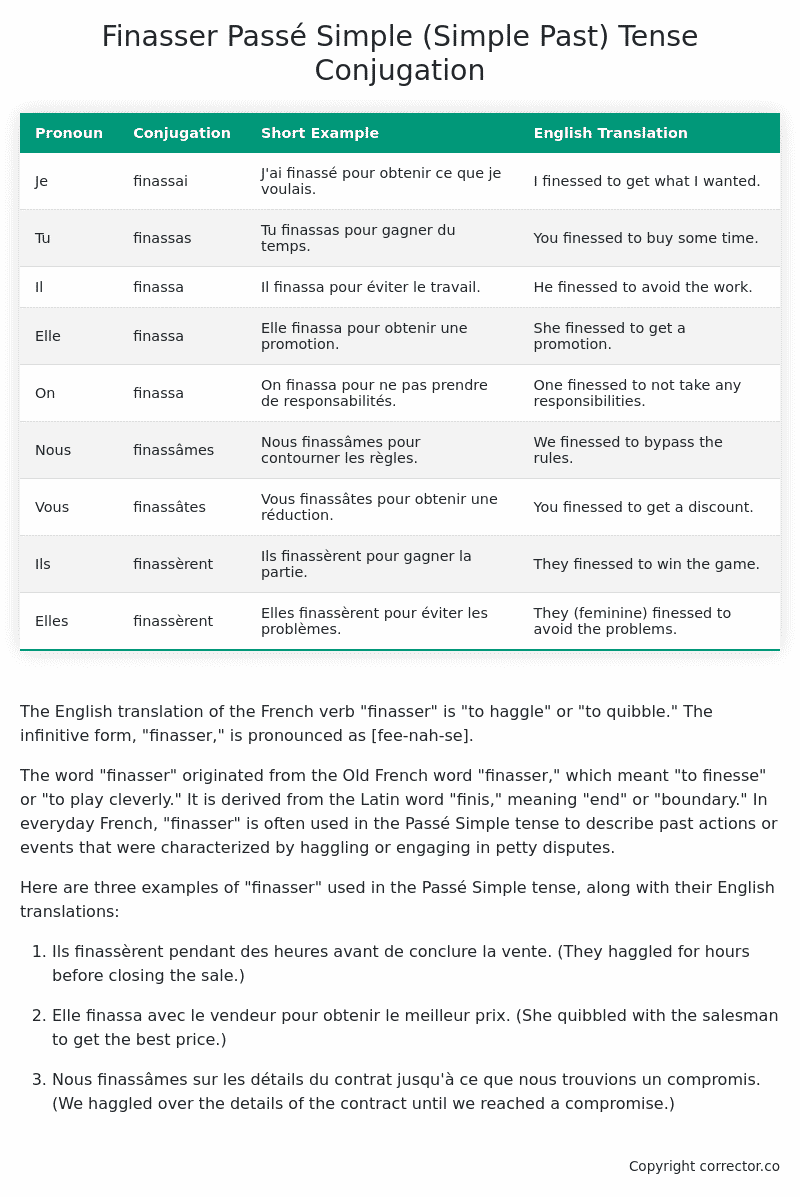Passé Simple (Simple Past) Tense Conjugation of the French Verb finasser
Introduction to the verb finasser
The English translation of the French verb “finasser” is “to haggle” or “to quibble.” The infinitive form, “finasser,” is pronounced as [fee-nah-se].
The word “finasser” originated from the Old French word “finasser,” which meant “to finesse” or “to play cleverly.” It is derived from the Latin word “finis,” meaning “end” or “boundary.” In everyday French, “finasser” is often used in the Passé Simple tense to describe past actions or events that were characterized by haggling or engaging in petty disputes.
Here are three examples of “finasser” used in the Passé Simple tense, along with their English translations:
-
Ils finassèrent pendant des heures avant de conclure la vente.
(They haggled for hours before closing the sale.) -
Elle finassa avec le vendeur pour obtenir le meilleur prix.
(She quibbled with the salesman to get the best price.) -
Nous finassâmes sur les détails du contrat jusqu’à ce que nous trouvions un compromis.
(We haggled over the details of the contract until we reached a compromise.)
Table of the Passé Simple (Simple Past) Tense Conjugation of finasser
| Pronoun | Conjugation | Short Example | English Translation |
|---|---|---|---|
| Je | finassai | J’ai finassé pour obtenir ce que je voulais. | I finessed to get what I wanted. |
| Tu | finassas | Tu finassas pour gagner du temps. | You finessed to buy some time. |
| Il | finassa | Il finassa pour éviter le travail. | He finessed to avoid the work. |
| Elle | finassa | Elle finassa pour obtenir une promotion. | She finessed to get a promotion. |
| On | finassa | On finassa pour ne pas prendre de responsabilités. | One finessed to not take any responsibilities. |
| Nous | finassâmes | Nous finassâmes pour contourner les règles. | We finessed to bypass the rules. |
| Vous | finassâtes | Vous finassâtes pour obtenir une réduction. | You finessed to get a discount. |
| Ils | finassèrent | Ils finassèrent pour gagner la partie. | They finessed to win the game. |
| Elles | finassèrent | Elles finassèrent pour éviter les problèmes. | They (feminine) finessed to avoid the problems. |
Other Conjugations for Finasser.
Le Present (Present Tense) Conjugation of the French Verb finasser
Imparfait (Imperfect) Tense Conjugation of the French Verb finasser
Passé Simple (Simple Past) Tense Conjugation of the French Verb finasser (You’re reading it right now!)
Passé Composé (Present Perfect) Tense Conjugation of the French Verb finasser
Futur Simple (Simple Future) Tense Conjugation of the French Verb finasser
Futur Proche (Near Future) Tense Conjugation of the French Verb finasser
Plus-que-parfait (Pluperfect) Tense Conjugation of the French Verb finasser
Passé Antérieur (Past Anterior) Tense Conjugation of the French Verb finasser
Futur Antérieur (Future Anterior) Tense Conjugation of the French Verb finasser
Subjonctif Présent (Subjunctive Present) Tense Conjugation of the French Verb finasser
Subjonctif Passé (Subjunctive Past) Tense Conjugation of the French Verb finasser
Subjonctif Imparfait (Subjunctive Imperfect) Tense Conjugation of the French Verb finasser
Subjonctif Plus-que-parfait (Subjunctive Pluperfect) Tense Conjugation of the French Verb finasser
Conditionnel Présent (Conditional Present) Tense Conjugation of the French Verb finasser
Conditionnel Passé (Conditional Past) Tense Conjugation of the French Verb finasser
Conditionnel Passé II (Conditional Past II) Tense Conjugation of the French Verb finasser
L’impératif Présent (Imperative Present) Tense Conjugation of the French Verb finasser
L’impératif Passé (Imperative Past) Tense Conjugation of the French Verb finasser
L’infinitif Présent (Infinitive Present) Tense Conjugation of the French Verb finasser
L’infinitif Passé (Infinitive Past) Tense Conjugation of the French Verb finasser
Le Participe Présent (Present Participle) Tense Conjugation of the French Verb finasser
Le Participe Passé (Past Participle) Tense Conjugation of the French Verb finasser
Struggling with French verbs or the language in general? Why not use our free French Grammar Checker – no registration required!
Get a FREE Download Study Sheet of this Conjugation 🔥
Simply right click the image below, click “save image” and get your free reference for the finasser Passé Simple tense conjugation!

Finasser – About the French Passé Simple (Simple Past) Tense
Formation
Usage
Narration
Historical Context
Interactions with other tenses
Passé Composé
Imparfait
Conditional and Subjunctive
Summary
I hope you enjoyed this article on the verb finasser. Still in a learning mood? Check out another TOTALLY random French verb conjugation!


